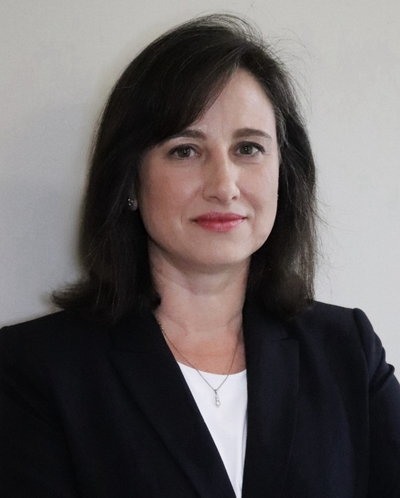Meet Deborah Citrin, NCI-CCR’s New Scientific Director for Clinical Research
BY ANNELIESE NORRIS, NCI

CREDIT: NCI-CCR
Deborah Citrin was named the scientific director for clinical research at NCI-CCR.
Deborah Citrin has been named the new scientific director for clinical research of NCI’s Center for Cancer Research (CCR), where she once served as deputy director. Citrin leads the Prostate Radiotherapy Program and is a senior investigator of the Radiation Oncology Branch. She is an internationally recognized expert in prostate cancer, radiation oncology, and normal tissue radiobiology. She received NIH tenure in 2015.
Citrin has held many leadership roles over her career including as an NIH and NCI-CCR Women Scientist Advisor, chair of the NCI-CCR Clinical Promotion Review Panel, and vice chair of the NCI-CCR Clinical Tenure Review Panel. Among her many accomplishments, she has received the NIH Director’s Alan S. Rabson Award for Clinical Care (2016), the NCI Director’s Emerging Leader Award (2018), and the NIH Director’s Ruth L. Kirschstein Mentoring Award (2023).
“I am thrilled that Dr. Citrin has assumed the role of scientific director for clinical research,” said James Gulley, acting codirector of NCI-CCR. “She brings invaluable institutional knowledge, an extensive clinical background, an unmatched work ethic, and a collaborative team spirit.”
From NC to NCI
Citrin grew up in North Carolina, where she earned her medical degree at Duke University School of Medicine (Durham, North Carolina). There, she participated in the Howard Hughes Medical Student Research Fellow Program. She completed an internal medicine internship in 2001 at Washington Hospital Center in D.C., and then a residency in radiation oncology in the then-joint program among NCI, Walter Reed Medical Center, and the Navel Medical Center.
After her residency, Citrin stayed on as a staff clinician at NCI. “At the time there were no tenure-track positions available,” she recalled. Her enthusiasm for both laboratory science and clinical research led Lee Helman, NCI-CCR scientific director for clinical research (2007-2016), and Robert (Bob) Wiltrout, NCI-CCR director (2005-2015), to create the Assistant Clinical Investigator (ACI) program at NCI-CCR. Citrin was one of the first people appointed as an ACI. She later transitioned to a tenure track investigator position.
New strategies to target prostate cancer
As a radiation oncologist, Citrin treats prostate cancer using various forms of radiation. A portion of Citrin’s laboratory is dedicated to developing strategies to enhance the capacity of radiation to kill tumor cells while protecting normal tissue from the side effects of radiation treatment.
Although Citrin uses external beam radiation most frequently to treat prostate cancer, she also delivers prostate brachytherapy (PMID: 28576185), which is a widely used treatment that involves placing radioactive sources into the prostate gland to kill the cancer cells while causing less damage to healthy tissue nearby.
She is passionate about developing new strategies to increase the chance of cure and reduce side effects for her patients. To this end, she partnered with a company that developed (nonradioactive) small silicone drug-delivery devices that are preloaded with hormonal medications often delivered systemically to treat prostate cancer during radiation. In collaboration with her colleagues in Urologic Oncology, Interventional Oncology, and Molecular Imaging, Citrin inserts these devices into the prostate tumor using a preloaded needle where the drug elutes over time, and importantly, only targeting the tumor and thus reducing the substantial side effects associated with systemic delivery.
“It’s pretty amazing, especially if you only need to deliver the drug to the tumor because the risk of metastasis is small, but the risk of local recurrence is high,” Citrin explained. Whilst only a proof of principle, there are potentially “lots of opportunities for delivering drugs to localized tumors in a way that will minimize systemic side effects,” she said, adding the example of using PARP inhibitors or other small molecules to sensitize tumor radiation or to treat or prevent certain types of cancer when used alone.
In the clinic, Citrin tries to understand whether there are ways to better predict whether a patient’s prostate cancer is going to recur after a curative radiation treatment. Citrin and her collaborators, who include Ismail Baris Turkbey and Peter Choyke of the Molecular Imaging Branch, have conducted several studies to use novel imaging modalities to focally treat prostate cancers that have either recurred after surgery or that have recurred after radiation. Along with Adam Sowalsky, head of the NCI-CCR Prostate Cancer Genetics Section, Citrin is working to integrate imaging, transcriptomics, and tissue biomarkers to predict recurrence with the goal of eventually being able to adapt treatments to personalize prostate cancer treatment (PMID: 37205576).
Raising the bar
Citrin understands the inner workings of NCI, so her vision as the scientific director for clinical research is to foster collaboration between basic and clinical research and to build bridges and develop programs with funding mechanisms that will allow NCI-CCR to capitalize on that relationship.
“The ability to rapidly translate laboratory findings into clinical trials to enhance the lives of cancer patients is part of what makes NCI-CCR so unique and special,” said Citrin. Helping CCR leverage NCI’s expertise in data science is one of Citrin’s priorities. “The possibilities of collectively coming together under one umbrella to learn more from our independent studies through collaboration offers tremendous opportunity,” she said.
When she is not working, you might find Citrin in her kitchen baking up a culinary delight or gardening. Citrin has been a science fiction fan since she was a child and is still an avid reader but admits, sadly, these days she does not have much spare time, especially with three children ranging from elementary school to middle school to high school ages—each of whom play sports (soccer and baseball are family favorites).
Listen to Citrin interview her daughter, Rachel, in honor of International Day of Women and Girls in Science.
Anneliese Norris, a scientist at NCI, is working on HIV dynamics and replication. In her spare time, she enjoys reading and building with LEGO blocks.
This page was last updated on Tuesday, November 5, 2024
